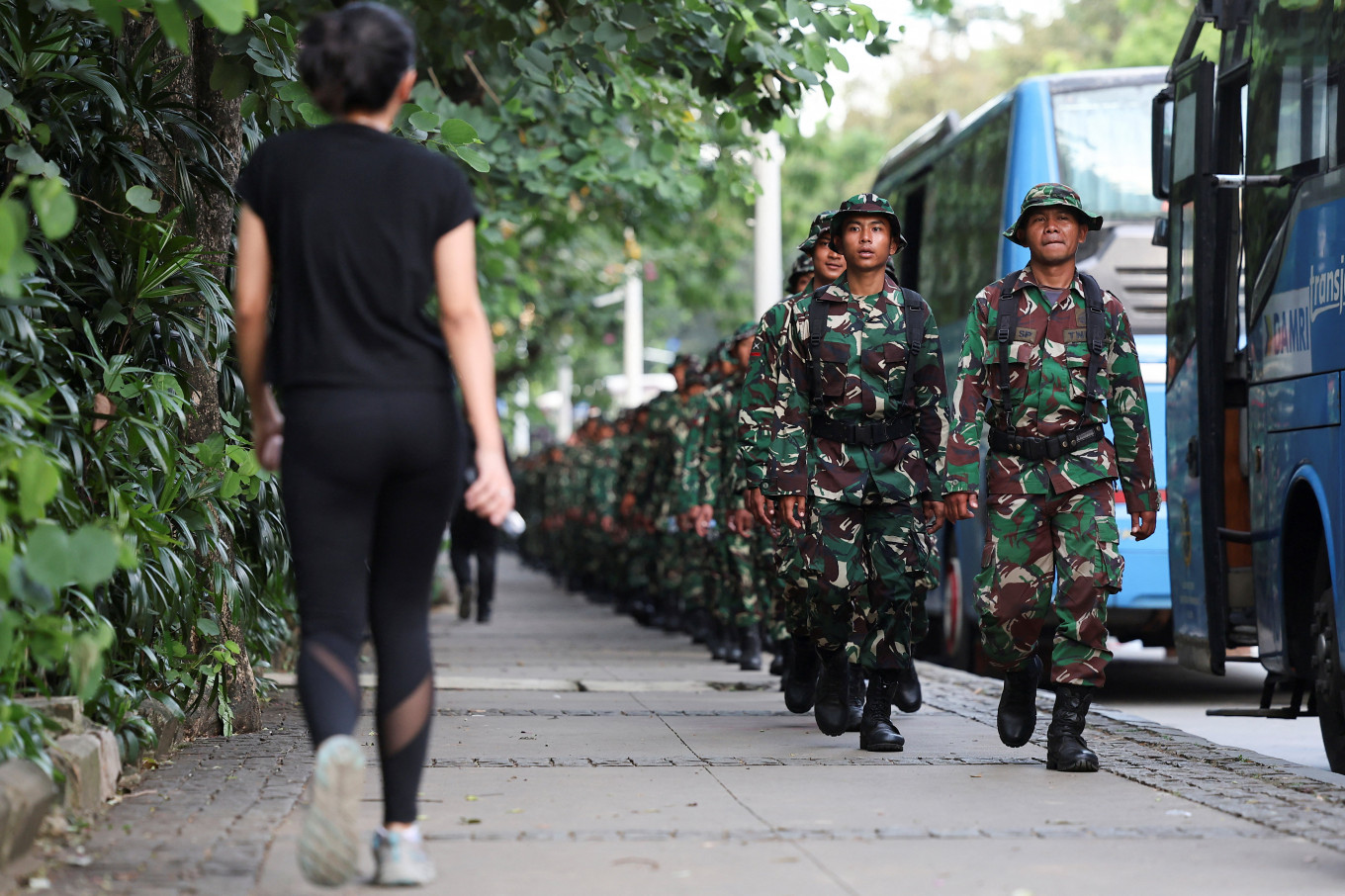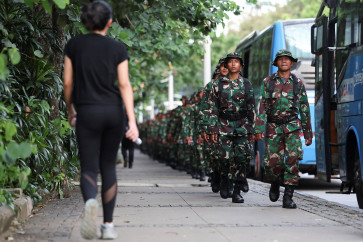Popular Reads
Top Results
Can't find what you're looking for?
View all search resultsPopular Reads
Top Results
Can't find what you're looking for?
View all search resultsBack to barracks and back to basics: The only path to a professional TNI
TNI’s hard power consists of older platforms and has limitations in modern network-centric warfare, making it vulnerability to attacks from enemies with advanced cyber capabilities and more sophisticated air defense systems.
Change text size
Gift Premium Articles
to Anyone
 Indonesian Military (TNI) personnel march outside the National Monument (Monas) complex on Sept. 2, amid widespread anti-government protests and rioting over issues such as extra pay for lawmakers and their housing allowances that resulted in riots which escalated after a motorcycle taxi (ojol) driver was killed by a police vehicle, in Jakarta. (Reuters/Willy Kurniawan)
Indonesian Military (TNI) personnel march outside the National Monument (Monas) complex on Sept. 2, amid widespread anti-government protests and rioting over issues such as extra pay for lawmakers and their housing allowances that resulted in riots which escalated after a motorcycle taxi (ojol) driver was killed by a police vehicle, in Jakarta. (Reuters/Willy Kurniawan)
T
he journal Prisma, in collaboration with the think tank Lab45, has published a special edition commemorating the 80th anniversary of Indonesia’s independence and the Indonesian Military (TNI), focusing on civil-military relations amid a crisis of democracy.
The journal highlights two phrases frequently echoed in public spaces by protestors, yet rarely understood in depth, namely “back to barracks” and “back to basics”. While they may sound similar, both suggesting a return to the TNI's core functions, they are, in fact, distinct concepts, each with unique implications for the future of military professionalism within an increasingly complex geopolitical landscape.
The calls for the TNI to go back to barracks and back to basics are not mere slogans, they are a strategic ultimatum. They stem from a rational analysis based on global dynamics and the character of 21st-century warfare. Such a reminder is neither a choice nor is it born of hatred, but rather a historical obligation to ensure the TNI stays relevant, strong and respected.
Failure to take this step will cost the TNI its credibility and relevance amid the brutal and unforgiving waves of future warfare. We must admit that we do not know the character of future warfare and the conventional model is already obsolete.
Military strength that is translated in stacks of tanks and aircraft carriers has been replaced by a much more complex and asymmetric spectrum of conflict. War no longer happens on land, at sea and in the air, but also in the cyber domain, outer space and most crucially, the information domain. Our adversaries will cripple vital infrastructure through cyberattacks, manipulate public narratives with propaganda and undermine national stability without firing a single shot.
To confront these threats, "back to basic" is not a step backward but a foundation for a leap forward. Focusing on the military's core duties is the only way to achieve the professionalism required.
First, modernizing defense equipment for the future. Instead of spending resources on non-military functions, the defense budget must be reallocated to acquire weaponry that aligns with the character of modern warfare. We need an integrated Command, Control, Communications, Computers, Intelligence, Surveillance, and Reconnaissance (C4ISR) system, a fleet of combat and reconnaissance drones, and absolute offensive and defensive cyber warfare capabilities. The mastery of artificial intelligence will be a decisive factor in rapid tactical decision-making, while the development of hypersonic weapons will fundamentally alter attack and defense doctrines.

















